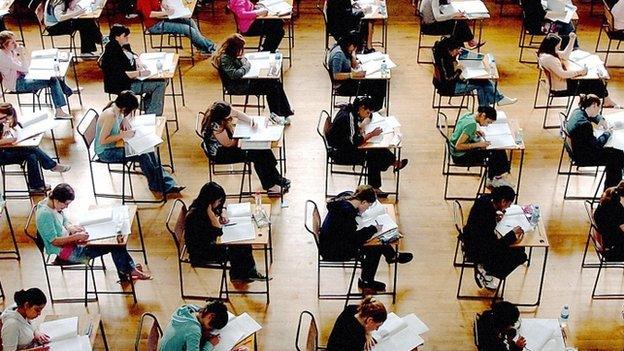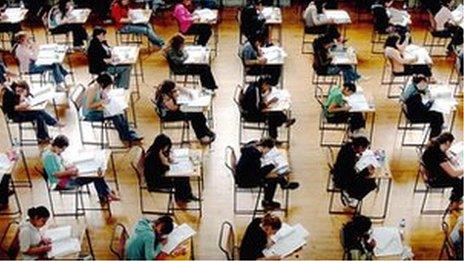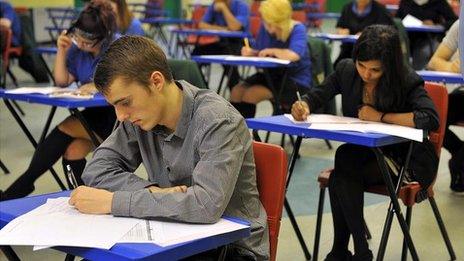Grade squeeze feared under pressure of summer-only exams
- Published

Anecdotally schools have reported more problems with running public exams this year, says the Examination Officers Association
GCSE and A-level results in England may drop this year with the switch to end-of-course exams and an end to winter resits, exam officers have warned.
Schools had struggled to accommodate increased entries for summer exams, said Andrew Harland, chief executive of the Examination Officers Association.
He said the exam system in schools was "under pressure... and that's when people make mistakes".
"Our concern is the impact on students," said Mr Harland.
The body, which helps teaching and support staff who run exams in schools, is carrying out a survey of its membership to determine the impact of this year's changes.
Extra pressure
Mr Harland said that so far there had been anecdotal evidence of schools struggling with the sheer volume of entries all focused on one period, rather than being spread over the year as in the past.
Schools were "having issues with accommodation and timings", said Mr Harland.
He said that in many cases the infrastructure was not in place to meet the increased demand.
The survey asks exams officers:
if they have found this year's summer exam season more stressful than in previous years
whether they have experienced an increase in entries for public exams
whether there have been more exam clashes than usual
if they have struggled to find enough invigilators
Mr Harland said the survey was an attempt to collect solid data because of concerns the needs of students were being forgotten in the stress of implementing the changes.
"Everyone is under stress," said Mr Harland. "The students should be at the top of the pile - but this year they are at the bottom of the pile.
"If they don't make their expected grades, we won't know until it's too late, and they will have to wait until next summer to resit."
Ofqual warning
Last week Glenys Stacey, head of exams regulator Ofqual, wrote to schools warning them to expect greater variations in results than in previous years.
Ms Stacey said the changes had resulted in many more students entering GCSE mathematics this year than last summer.
She said there had also been a rise in entry numbers for AS- and A-levels where "the removal of the January exam series has meant students could not take one unit early, or resit an AS unit in year 13".
"As a result, the overall entries are higher this summer compared to summer 2013," she said.
Ms Stacey said that collectively the changes were likely to lead to more variability in results for individual schools.
"It is not possible to predict at this stage how the national picture will look - these changes do not pull results universally in one direction or another, but together they are likely to affect the national picture to some extent," wrote Ms Stacey.
In a statement, Ofqual said its aim was "to make sure that, overall, students are not disadvantaged or advantaged because of changes made to the exams".
"The linear structure for GCSEs and A-levels in England will free up teaching and learning time previously taken up with repeated assessments," it said.
"The number of resits taken under the previous modular structure added a great deal of complexity to the awarding process and impacted on standards."
A spokeswoman for the awarding body Edexcel said: "This year's timetable is in fact very similar to last year's, but it may feel more congested due to fewer students sitting exams earlier in the year.
"For a school, the impact may be that they are often dealing with greater volumes of students in the summer exam series."
A Department for Education spokeswoman said the aim of the changes was "to put an end to the resit culture, allow more time for teaching and learning and ensure pupils develop an in-depth and lasting understanding of a subject.
"We want GCSEs and A-Levels to be high-quality, highly demanding qualifications comparable to those in the world's best-performing education systems."
- Published1 November 2013

- Published19 September 2013
- Published11 June 2013

- Published11 June 2013
